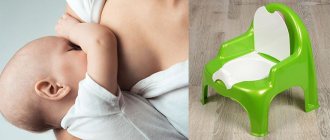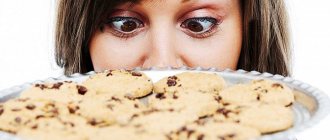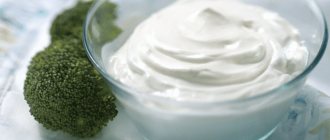Norm
A baby's stool is normal if it does not cause any disturbances accompanied by a deterioration in the child's condition. Feces can have different consistency and color - yellow, green, brown.
If there are changes in the color of the stool, there is no need to worry, because this is how the baby’s body reacts to the food received from the mother. For example, if a nursing woman consumes dairy foods, the baby will react to her milk with yellow stools, and when eating plant foods, the stool will turn green.
Due to the body's reaction to food that is easily digested, cheesy lumps with a sour smell may appear in the child's stool, which is also normal.
However, discharge accompanied by blood or mucus is not normal, so if you notice these inclusions, you should immediately consult a doctor.
Signs of normal stool:
- the child's well-being;
- stable weight gain;
- deep sleep;
- lack of restless behavior.

Also, parents of a newborn need to take into account that during the first 4 weeks of life the baby often poops, and this process can occur approximately 10 times per day. Many children defecate after every meal. From 2 to 6 months, the frequency of bowel movements decreases to 3-5 times. After 6 months, children poop 1-2 times a day in small volumes.
Treatment of diarrhea (diarrhea) in infants
Diarrhea in an infant is not an independent pathology, but a symptom. Therefore, drug therapy is aimed at eliminating the causes of diarrhea. If there is liquid diarrhea every 30-40 minutes, the baby is weakened and does not eat, you need to call an ambulance.
If there are no dangerous signs, you can treat your baby at home. For diarrhea, the baby is given rice broth 50 ml 3 times a day. Safe medications are used to normalize the functioning of the gastrointestinal tract.
Medicines for diarrhea: medications
- Enterofuril, Enterol are antiseptics, suitable for treating a breastfed baby with dysbacteriosis or poisoning.
- Smecta, Smectite – sorbents.
- Hilak forte, Linex - to restore microflora (prescribed for foamy stools).
- Lactase baby (for better absorption, added to expressed milk).
Expert opinion
Sokolova L. S.
Pediatrician of the highest category
Medicines for diarrhea in infants are prescribed only by a doctor, having determined the nature of the symptom.
It is necessary to adjust the mother’s menu, exclude laxative foods: beets, prunes, tomatoes, legumes, fermented milk drinks. If diarrhea is a reaction to complementary feeding, leave only breastfeeding for a while.
Prevention of dehydration is necessary. You should give your child warm water, 1 teaspoon every 20-30 minutes. After 6 months, you can give your baby a decoction of dried fruits without sugar. Regidron, Gidrovit are used, one sachet per day.
For diarrhea with colic and gas formation, the baby can be given a chamomile decoction - 1 tbsp. l. pour a glass of boiling water over the flowers and leave for 30 minutes. Strain, cool, give a teaspoon every 3 hours. The infusion will calm the intestines, improve the baby's sleep and mood.
Prevention of diarrhea in infants involves following good hygiene rules. It is necessary to regularly wash and sterilize toys, put on “anti-scratch” shoes for the baby, and prevent crawling on public floors. It is better to cover a certain square with diapers or install a playpen.
Artificial feeding
With artificial feeding, stool parameters are somewhat different from stool during breastfeeding. Firstly, in this case, the stool is darker in color, which has a yellowish or brownish tint.
If the mixture is not prepared correctly, the stool may have a too thick consistency.
When bottle-fed, liver problems may occur and the stool will be bright yellow or orange. The presence of blood in the stool is indicated by the black color of the biomass.
Consistency of stool with different diets
Due to differences in the composition of formula and breast milk, a baby may have different stool consistency:
- The stool of a mixed-fed or bottle-fed baby will be different. The consistency becomes pasty, dense, and the unpleasant odor becomes several times stronger. The more mixture is present in the baby's diet, the stronger the smell will be pronounced after bowel movements. Due to the fact that with mixed feeding, newborns receive only foremilk, the color of the stool may become greenish. In babies who eat only formula, it is close to brown and pale.
- Loose stool in a newborn during breastfeeding is normal if it is yellow in color (variants of shades are possible, depending on the mother’s diet) and has a slightly unpleasant smell of sour milk. Even a change in the color of stool to green is considered normal. This happens when mom eats mostly vegetables and fruits, especially raw ones. A baby's loose yellow stool indicates the predominance of dairy products in the mother's diet.
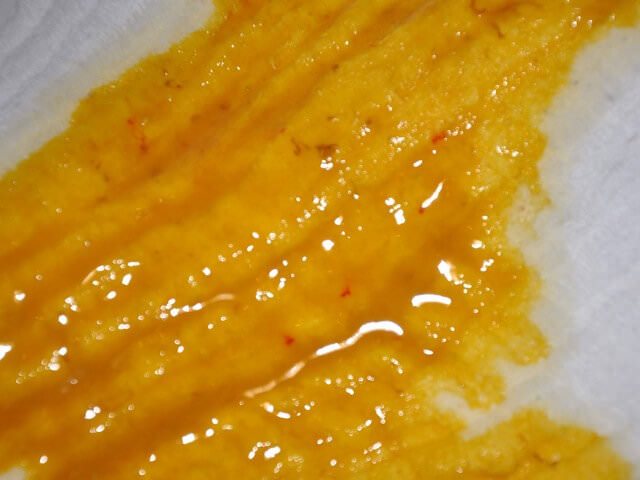
After complementary feeding, loose, yellow stools are less common. It depends on the products introduced. Based on the fact that you gave the baby, the stool may become harder or change color. Most often, changes can be noticed after the introduction of meat, eggs, and cereals.
When pathological stools appear and colic occurs, doctors first of all recommend changing the mother’s diet. Infants who are bottle-fed are offered a new formula (a different brand, fermented milk or made from goat milk).
Mixed feeding
With mixed feeding, the newborn's stool may be brownish in color, and the bowel movement may occur only 1-2 times a day. When preparing a formula that is too thick, your baby may develop cheesy particles in his stool - this process does not pose a health threat if it disappears after a few days. Breast milk with a mixed type of feeding can also cause changes in stool.
This reaction occurs due to an unbalanced diet, consumption of foods or medications prohibited for the baby.
If you experience loose stools during a mixed diet, you should under no circumstances refuse to feed breast milk, since it contains all the necessary microelements for the proper development of the baby.
Diarrhea
Unlike loose stools, diarrhea poses a risk to the baby's health, so it must be recognized quickly and treated.
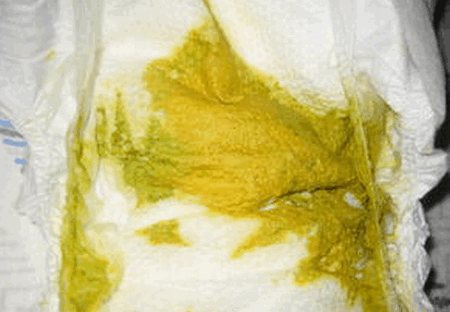
Signs of diarrhea:
- increased frequency of bowel movements;
- presence of water in stool;
- sudden bowel movements accompanied by gases and a strong sour odor;
- bright green color of stool;
- discharge is accompanied by mucus, foam, and blood streaks;
- there is a deterioration in the baby’s condition;
- bloating;
- temperature may appear;
- loss of appetite.
If diarrhea does not go away on its own within 3 days, it is necessary to show the baby to a pediatrician. Otherwise, the child may become dehydrated.
Causes of diarrhea in an infant
Factors influencing the occurrence of diarrhea are divided into correctable and dangerous. In the first case, the mother will cope with the situation on her own by changing her diet or feeding technique. Often the cause cannot be influenced, then you just need to wait it out.
Correctable reasons
- New foods in the mother’s diet are laxative and allergenic.
- Overfeeding.
- Incorrect introduction of complementary foods.
- Feeding technique is impaired - frequent breast changes.
- Teething.
- The result of taking antibacterial drugs (by mother or baby).
- Stress – fear, moving, hypothermia.
Mother's foods that cause diarrhea in the child are mayonnaise and ketchup, baked sweets, smoked foods, marinades. It is recommended that mother exclude these foods from her diet.
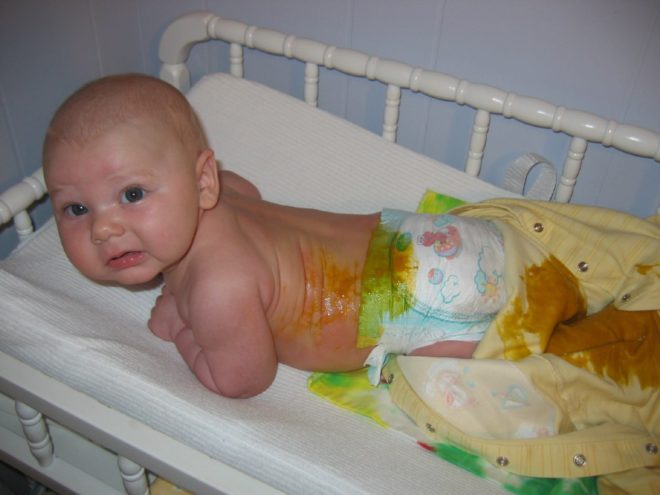
Overeating or improperly added complementary foods are a common cause of diarrhea in a breastfed newborn. New food can be given in quantities of only 20-30 grams. If the reaction is normal within 3-5 days, the portion is increased.
You need to put your baby to your breast for at least 40 minutes (one breast should be given per feeding). The deeper the milk, the thicker and more nutritious it is. Even with a stable sucking reflex, it takes 20-30 minutes for the baby to reach the end of hindmilk. Violation of feeding technique, when the child receives only liquid foremilk, often provokes green stool.
If teeth are being cut after medication or stress, it is recommended to simply wait (provided the child is in normal condition). But there are also dangerous causes of diarrhea. The condition caused by them requires medical attention.
Dangerous reasons
- Dysbacteriosis (frequent changes of diarrhea and constipation, foamy yellow, green stools).
- Lactase, gluten deficiency (gas, pain, poor appetite).
- Intestinal infection (temperature from 38.0°C).
- Worm infestation.
- Surgical pathologies of the gastrointestinal tract.
- Food poisoning (poor quality mixture).
Dysbacteriosis is often caused by poor hygiene - the baby puts objects and toys in his mouth, crawls on a dirty floor. Since the intestinal microflora of a baby is very weak, the entry of pathogens in every eighth case provokes inflammation of the intestinal walls. Yellow foamy stool is the first sign of dysbiosis.
The most dangerous cause of diarrhea during breastfeeding is an intestinal infection. Accompanied by fever. The stool smells rotten, mucus and blood streaks are found in the stool. Rotavirus infection also causes a cough and runny nose.
In case of infection, urgent hospitalization is required, especially if the child is less than 6 months old. In other cases, therapy at home is allowed.

What should parents do?
- If a baby has loose stools while breastfeeding, under no circumstances should you deprive him of milk. Breast milk helps the newborn to adapt the intestines to processing food and populates it with beneficial microorganisms. Milk also helps replenish water losses in the presence of liquid stool.
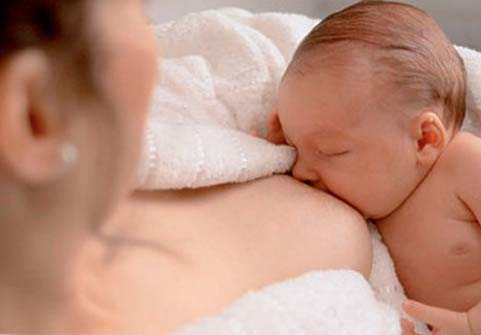
- A breastfeeding woman needs to make future meals balanced. To do this, it is recommended to introduce new foods into the diet in very small portions in order to determine which of them the baby reacts to.
- The baby should be kept at one breast longer so that he can also feed on hind milk, which differs from fore milk in being more caloric.
- If the baby's condition begins to worsen, you should contact your pediatrician.
Symptoms of the disease
In some cases, loose stools may be the main symptom of a developing disease, so it is important to monitor the child’s condition. You should immediately call a doctor if you experience the following symptoms:
- the baby is constantly capricious;
- he has no appetite;
- the newborn’s belly is swollen, he often presses his legs towards him;
- there is a failure to gain weight;
- sudden increases in temperature, vomiting, nausea, feces with mucus may be symptoms of an intestinal infection;
- the baby is lethargic and does not want to do anything;

- urination is absent or accompanied by a pungent odor;
- the appearance of green stool with large lumps and mucus may indicate dysbacteriosis;
- Constant liquid yellow stool that does not change to a normal consistency may indicate lactose intolerance. In the first month of life, the baby’s body may not produce enough enzyme to break down the lactose contained in breast milk.
In no case should treatment be delayed, since a long progressive course of the disease can disrupt the development of the baby.
How to restore a chair
To normalize stool in infants, doctors usually recommend using certain feeding techniques and principles.
- When feeding, you need to make sure that the baby grasps most of the areola, and not just the nipple.
- If there is a lack of milk, measures should be taken to increase its production. To do this, you need to put the newborn to the breast more often and feed him every 3 hours.
- Don't forget to express the remaining milk and store it in the refrigerator.
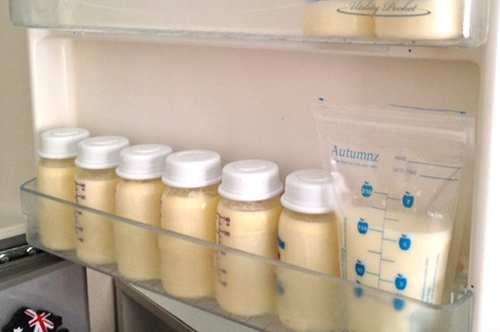
- It is necessary to try to feed with hind milk.
- Feeding should be stopped only when the baby comes off the breast on his own.
Often, loose stools in a baby are a common phenomenon that is within the normal range, but it is necessary to constantly monitor various changes both in the stool and in the general well-being of the newborn. If liquid stool begins to be accompanied by mucus or blood, this indicates an illness that must be treated immediately. If other signs that are not typical for the norm appear, you should seek help from a pediatrician.
Loose stools in a breastfed baby

Caring for the health of the baby, young mothers closely monitor any changes in his mood, behavior, appetite and even the fulfillment of natural needs. In this case, quite often the cause of increased anxiety is loose stool in a breastfed baby.
- What should a baby's stool be like?
- Mother's nutrition and baby's stool
- Reasons for concern
- Diarrhea in infants: causes and symptoms
- Prevention
Let's try to figure out what contents of a diaper are considered normal. And in what cases should parents “sound the alarm” and seek medical help?
What should a baby's stool be like?
The stool of any person, child or adult, primarily depends on the food he eats.
And if an adult eats only milk day after day, then his feces are unlikely to be hard.
The same applies to an infant: as long as his only food is mother's milk, the baby's stool will always be liquid.
However, you should not lose sight of any changes in the baby’s bowel movements, so as not to miss the first signs of illness.
To do this, it is important to know what the normal contents of a diaper should be.
Color and consistency
During intrauterine development, meconium, a semi-liquid, tarry, greenish-black, odorless substance, collects in the fetal intestines.
It consists of exfoliated cells of the intestinal mucosa, amniotic fluid that has entered the child’s body and other ingredients.
Immediately after the baby is born, his intestines begin to get rid of meconium. Therefore, in the first two or three days, a newborn’s stool is always dark in color, with a consistency reminiscent of semi-liquid sour cream.
By the end of the first week, lactation usually returns to normal.
Now the baby’s stools acquire a characteristic mushy consistency and a faint sourish odor.
In this case, the color of stool depends on the predominance of certain foods in the diet of a nursing woman and can be as follows:
• light orange or ocher-yellow if milk soups, cereals and fermented milk products predominate in the mother’s diet;
• greenish-yellow if the mother eats a lot of plant foods.
The presence of curdled inclusions in the baby’s stool is also considered normal - the remnants of undigested milk in the intestines.
Sometimes the stool may be almost watery and even slightly foamy. This is also not a cause for concern.
Frequency
The frequency with which an infant “walks around” also becomes a matter of concern for most young parents.
Some people think that their child’s bowel movements are too frequent, while others, on the contrary, worry that the baby is constipated.
After birth, when the intestines have already been cleared of meconium, the newborn may not poop at all for several days.
This happens because the mother does not yet have a large amount of milk and the baby eats only colostrum, which is almost completely absorbed in the intestines.
Usually, the baby's stool improves as soon as the mother's lactation returns to normal.
However, here too there are no uniform frequency criteria.
Some babies “walk a lot” after each feeding, that is, from 5 to 10 times a day.
For others, it is enough to empty the intestines 3-4 times.
You should not be afraid of frequent bowel movements in your baby, since the baby’s body is just beginning to produce the enzymes necessary for normal digestion of food, and the intestinal flora does not yet contain enough bacteria necessary for digestion.
Some babies poop once every two or three days and still feel great.
It’s just that their body is designed in such a way that it almost completely absorbs breast milk, so feces hardly accumulate in the intestines.
Drawing conclusions
So, loose stools in themselves should not cause concern in a baby feeding on mother's milk.
And to finally calm down, parents need to pay attention not only to the contents of the diaper, but also to the child’s behavior.
There is no reason to worry if the baby:
- sucks milk with appetite;
- gaining weight;
- sleeps well;
- smiles and “booms”;
- not capricious;
- poops effortlessly, doesn't strain and doesn't cry.
In addition, for many babies, the process of teething is accompanied by frequent and looser stools than usual.
This period can last up to two weeks, after which everything returns to normal.
Mother's nutrition and baby's stool
A breastfed baby is sensitive to any changes in his mother's diet.
Therefore, women during lactation need to be very strict in choosing products for their menu.
In order not to cause tummy pain, colic or diarrhea in your baby, it is advisable to consume only the following foods and dishes:
- vegetable or cereal soups;
- milk porridge;
- fermented milk products – kefir, fermented baked milk, sour cream, cottage cheese;
- wheat flour bread;
- lean meats - veal, beef, turkey;
- apples (fresh or baked), bananas.
You should not eat fried, smoked, canned or pickled food.
Useful tips for mothers: BABY HEALTH
You should also avoid products that contain dyes, sweeteners, preservatives and other “chemical” additives.
Of particular danger to infants are:
- chocolate and cocoa;
- honey and nuts;
- coffee;
- Fish and seafood;
- citrus;
- apricots, plums, pears, as well as red and orange fruits and berries;
- brown bread, butter pastries, various sweets;
- tomatoes, cucumbers, cabbage, legumes.
Baby nutrition experts recommend that nursing mothers keep a special food diary.
It is necessary to write down all the foods eaten and the child’s reaction to them every day. Such records will help parents find out what caused the changes in the baby’s stool.
Reasons for concern
If the baby is not teething and there were no violations in the mother’s diet, and the frequency of stool, as well as its consistency and color, has changed, then you should be wary.
The following behavior of the child should also be a cause for concern:
- screams often and for a long time;
- eats reluctantly, spits out breasts;
- pulls the legs towards the tummy;
- sleeps little and restlessly.
In addition, the baby may have:
- elevated temperature;
- bloating, gas;
- rashes on the body;
- runny nose;
- retraction of the fontanel.
In such cases, you should immediately seek medical help.
Since loose stools in combination with one or more of the listed signs can be the cause of urticaria, ARVI, otitis media, tonsillitis or other serious diseases.
Diarrhea in infants: causes and symptoms
The reasons why a small child may develop diarrhea are different.
The most likely ones are the following:
• food poisoning. Develops in a baby if a nursing mother allows herself to eat foods from the prohibited list or takes a medication;
• urticaria or other allergic disease. This is not only a reaction to food or medicine, but also to synthetic clothing, household dust, animal hair, cosmetic products and other irritants;
• dysbacteriosis. It occurs as a result of an imbalance of microflora in the child’s intestines and can also be caused by the mother’s consumption of inappropriate foods;
• intestinal infection (viral or bacterial).
According to the famous pediatrician Dr. Komarovsky, rotavirus infection occurs most often in young children.
In this case, a baby can become infected under the following circumstances:
• failure to comply with hygienic requirements for caring for the baby. In particular, if friends or relatives who come to talk to the baby forget to wash their hands;
• if one of the family members is diagnosed with an intestinal infection;
• if the baby is given rattles and other toys “straight from the store” without disinfecting them.
At the same time, Dr. Komarovsky advises parents to pay attention to how the baby walks “in general.”
The main distinguishing signs of diarrhea from ordinary loose stools:
• the child poops much more often;
• feces are expelled from the intestines abruptly;
• stools are more watery than usual;
• stool takes on a greenish tint;
• there is mucus or bloody streaks in the stool;
• feces have an unpleasant, sometimes even putrid odor.
In addition, the child also exhibits other manifestations of the disease - fever, poor appetite, vomiting, and moodiness.
Rotavirus infection in young children is a serious disease.
The most dangerous thing is dehydration, which manifests itself in a prolonged absence of urination, crying without tears, dry skin and mucous membranes, and sunken fontanel.
Therefore, if diarrhea or other symptoms of illness appear, Dr. Komarovsky strongly advises parents not to self-medicate, but to immediately consult a doctor.
If treatment is started on time and the parents follow all the doctor’s orders, the baby will be healthy very soon
Prevention
To prevent the contents of your baby’s diaper from becoming a cause for concern and worry, young mothers should follow simple but very important rules:
• Continue breastfeeding for as long as possible. Mother's milk is a source of vitamins and other substances beneficial to the child's body. They help strengthen the immune system and help fight disease.
• Be sure to follow a special diet so as not to provoke allergies or poisoning in the child.
• A nursing mother should coordinate the intake of any medications with her pediatrician.
• Take care of the child's hygiene. Do not allow him to stay in wet or dirty diapers, regularly carry out wet cleaning, ventilate the room, wash and treat all toys and dishes with disinfectant solutions.
To improve bowel function, the baby needs to massage the tummy several times a day, gently stroking it clockwise.
In addition, the child should be encouraged to engage in active movements and play to stimulate peristalsis and relieve bloating and constipation.
- about the author
- Recent publications
Tatiana Vasilyeva
author of the publication (site editor)
NURSE Mother of two daughters and grandmother of wonderful grandchildren.
Tatyana Vasilyeva recently published (see all)
- Artificial feeding of a child at 5 months - 08/01/2019
- When does colic begin in a newborn - 06/01/2019
- Frequent regurgitation in infants - 05/21/2019
